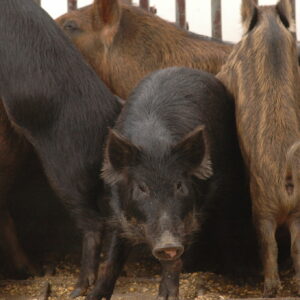MOLECULAR GENETICS
Significance
Advances in molecular genetics are proving useful for medicine, criminology, and plant breeding. Molecular markers are being used for breeding new peanut varieties. Unlike genetically-modified organisms (GMO’s), in which foreign genes are transferred through test-tube manipulation, molecular markers do not modify a plant genetically. Instead, they are a diagnostic tool, a type of gene fingerprint. In criminology, DNA fingerprints are used to identify guilty or exonerate innocent individuals. For peanut breeding, markers are used to identify individuals possessing or lacking specific genes for useful traits, for example, nematode resistance. Markers can allow selection of resistant plants even when disease pressure is absent.
- Marker-assisted selection. We have published recently the first molecular map representing the entire genome of the cultivated, tetraploid peanut, with 370 RFLP (restriction fragment-length polymorphism) markers (Burow et al., 2001) We have identified DNA markers associated with root-knot nematode resistance (Burow et al., 1996; Burow et al., 1996; Choi et al., 1999; Church et al., 2000), and these are being used for development of resistant varieties. .An example of DNA markers for nematode resistance can be seen in the figure below.
- Species classification. Molecular methods are being used widely to allow greater precision in classification of wild species. Introduction of root-knot nematode resistance from wild species was accomplished by combining A and B genome wild species diploid parents to make an AB tetraploid crossable with cultivated peanut. Use of molecular markers will allow rapid identification of additional rare B-genome species that can be combined with A-genome species to introduce additional genes, such as disease resistance, into cultivated peanut.
Goals
- Marker Development. Goals are to develop PCR-based markers of the peanut genome for use in introgression of wild species’ genes into cultivated germplasm. Additionally, we will develop markers usable in cultivated-by-cultivated crosses.
- Varietal development. We will identify molecular markers for traits important in varietal development. Initial applications are maturity and disease resistance.
- Wild species identification. We will use markers to assist in identification of B-genome wild species, and in peanut species classification in general.
Research Program
- Wild species identification. We have discovered DNA markers that identify B-genome species. Below, we can see a pattern that identified ‘B’-genome accessions.






